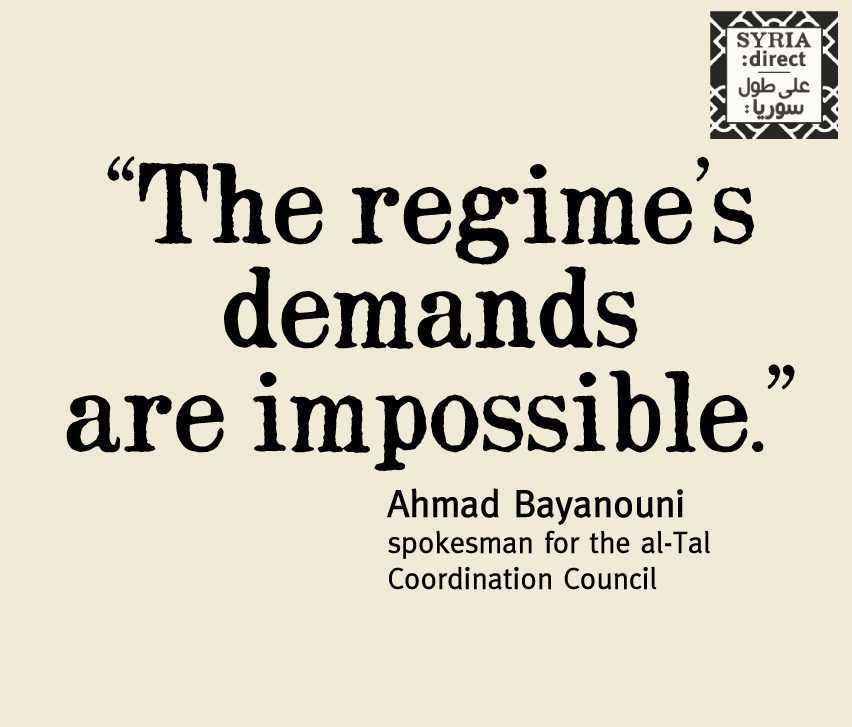Blockade firmly in place as rebels, citizens grow desperate in Damascus suburbs
Thursday marks the 50th day of a near-total regime blockade […]
10 September 2015
Thursday marks the 50th day of a near-total regime blockade of the northern Outer Damascus town of al-Tal, reportedly home to one million internally displaced Syrians.
A large number of the displaced in al-Tal have fled intense regime bombardment in the city of Douma, eight kilometers to the southeast, in order to take advantage of the security in al-Tal, which was under an unofficial truce with the regime for two years. Originally home to 100,000 people, there are now more than one million internally displaced Syrians living inside the city.
The regime blockade of al-Tal, 11km north of Damascus, began after rebels killed a regime soldier who entered the city in July, and coincided time-wise with similar blockades in a number of other Outer Damascus towns.
In two of those towns, al-Hameh and Qudsiya, a “reconciliation agreement” was reached more than a week ago promising relief for the trapped residents in return for significant rebel concessions, which they made.
Despite ongoing attempts to lift the siege on al-Tal through mediation with the regime, the city remains under a stiff blockade, Ahmad Bayanouni, spokesman for the al-Tal Local Coordination Council tells Ammar Hamou.
Charitable organizations in the city have announced “they can no longer provide for the displaced,” Bayanouni says, and although residents are dying of treatable illnesses, reconciliation seems out of reach.
“The regime’s demands are impossible.”
Q: Why did the siege end in Qudsiya and al-Hameh but not in al-Tal?
Essentially, the siege on Qudsiya and al-Hameh was broken after they accepted the regime’s conditions, including the normalization with the rebels and their inclusion into the [pro-regime] National Defense Forces.
In al-Tal, rebels have not accepted these conditions.
[Editor’s note: for more on the terms of the agreement, see here]Q: How are local leaders working to lift the siege? How is the regime responding?
The city’s leaders are exerting a large effort to lift the blockade of the city. They met with a regime delegation a few days ago, which promised them to open the road and bring necessities into the city, but the promises have not been carried out.
Q: Can you give us a glimpse of the medical situation in the city?
This has impacted the city the most. Most medicine is gone from the pharmacies, especially medicine for those with chronic illnesses such as heart conditions, high blood pressure and diabetes.
The only hospital in the city is on its way to shutting down because of the lack of medicine and its inability to carry out emergency operations and dialysis.
Everything related to surgery or needing electrical devices has been impacted by the blockade and the lack of fuel to work the generators.
A number of deaths have been recorded from chronic illnesses because of the dire situation in the city and the prevention of the sick from leaving to be treated.
Q: And the food situation?
The city’s residents have exhausted the food, and there is no food in the stores, 80 percent of which are closed. People have also used up their reserves of food in their homes and are rationing in order to survive.
The Red Crescent and charitable organizations that give assistance to the displaced families in the city have announced that their food reserves have dried up, and they can no longer provide for the displaced.
Q: Do you expect the blockade will be lifted soon?
The regime’s demands are impossible for rebels to carry out, and with the initiatives of city leaders being refused by the regime, I do not see the blockade being lifted soon.
Q: Do regime soldiers at checkpoints surrounding the city abide by the blockade, or do they look the other way in an attempt to indirectly help the people [of al-Tal]?
Unfortunately, they abide by the siege completely. They have not even allowed employees [coming in from outside the city] to bring in small bags of vegetables, which they destroy.
One exception was when two cars brought vegetables into the city, and they sold within minutes for exorbitant prices.







